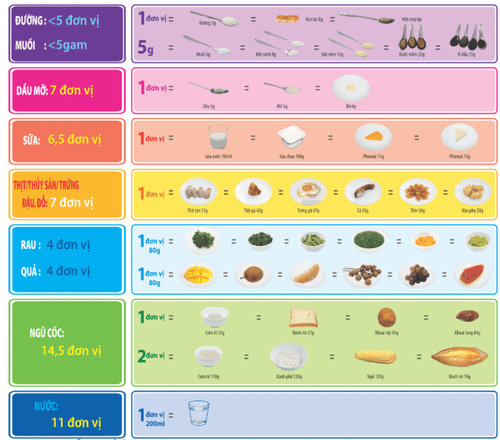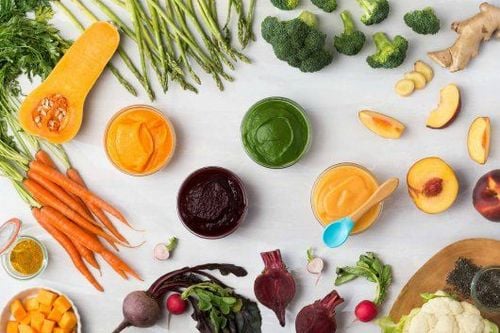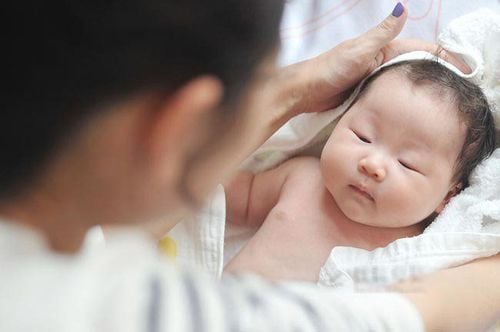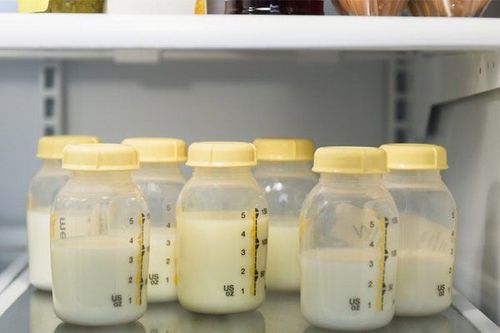This is an automatically translated article.
The article was professionally consulted by Specialist Doctor II Tran Thi Mai Huong - Obstetrician and Gynecologist - Department of Obstetrics and Gynecology - Vinmec Hai Phong International General Hospital. The doctor has 25 years of experience in examination and treatment in the field of Obstetrics and Gynecology, lower line surgery, laparoscopic surgery.Science has proven that exclusive breastfeeding during the first 6 months of life is extremely important for the comprehensive development of infants. Therefore, maternal nutrition plays an extremely important role. Please refer to the menu for nursing mothers as recommended by the National Institute of Nutrition to have the best nutrition to help mothers have enough milk to feed their babies.
In the first 6 months, the amount of antibodies of the baby is provided by the mother directly through breast milk, so ensuring enough energy and nutrients for the mother is also the best way to prevent disease for the baby. Children who are exclusively nourished with breast milk in the first 6 months will develop comprehensively both physically and intellectually, have good resistance, are less susceptible to infections, and are less likely to suffer from chronic diseases when growing up. contagious.
1. Nutritional needs for nursing mothers

During the breastfeeding period, a mother's good nutrition is to ensure that she has enough milk to feed her baby. Therefore, nursing mothers need to have a reasonable diet, and remember that the regime of work and rest combined with a comfortable mental state is also an important factor to ensure a healthy pregnancy. enough milk to feed the baby.
After giving birth, although the nutritional reserves during pregnancy have not been fully consumed, before giving birth as well as during childbirth, the mother has lost a lot of energy and nutrients. nutrition through blood loss during childbirth, mobilizing nutrients to produce colostrum in the last months of pregnancy, and continuing to secrete milk to feed the baby immediately after birth... Therefore, energy needs and The nutrients of nursing mothers are quite high, even higher than those of pregnancy.
Energy requirements: If compared at the same age group and the same level of physical activity, the energy requirement of a nursing mother will be about 500 Kcal higher than that of a normal woman. ie when not pregnant and when not breastfeeding), this energy is equivalent to about 3 bowls of rice with reasonable food divided into meals during the day.
Maternal energy needs during lactation also depend on physical activity status and weight gain during pregnancy, namely:
Mothers before and during pregnancy have good nutrition Gaining weight from 10-12kg will need to eat more to ensure energy requirements reach 2260 Kcal/day for light workers and 2550 Kcal/day for average workers. Mothers before and during pregnancy with poor nutrition, with weight gain of less than 10kg, will need to try to eat more and more diverse foods, to ensure enough energy needs while pregnant. breastfeeding. Protein requirements: Protein needs to be provided adequately during lactation as recommended for Vietnamese people. In the first 6 months, eat an extra 19 grams/day compared to normal needs, bringing the total to 79g/day. In the next 6 months, add 13g/day, so the total amount of protein needed in 1 day is 73g. The amount of animal protein should reach >= 30% of total protein. Should choose foods with high quality protein such as meat, fish, eggs, milk, beans...
The amount of protein in food can be estimated as follows: For every 100g of meat/meat supplies about 20g of protein, 100g of tofu provides about 10g of protein. Should use 6.5 units of milk/day (drink milk or eat dairy products such as yogurt, cheese). Eat fish at least 3 times a week.
Demand for fat (Lipid): The amount of fat eaten needs to provide 20-30% of dietary energy. Encourage the use of fats with a lot of long-chain polyunsaturated fatty acids such as n3, n6, EPA< DHA (found in some vegetable oils, fish oils, some fatty fish). This amount of fat is important for optimal brain and vision development in children. 1g of fat will provide about 9 Kcal of energy.
Vitamins and minerals: Vitamins and minerals are essential for a nursing mother. In addition to supplementing with natural foods in daily meals, it is necessary to have enough green vegetables (>=400g of fruits and vegetables/day) and enough fiber to avoid constipation.
Water needs: To produce enough milk, nursing mothers need to drink enough water, about 2-2.5 liters of water per day on average (equivalent to 12-15 cups of water).
2. Reasonable nutrition for nursing mothers
According to the recommendations of the National Institute of Nutrition, the daily diet of nursing mothers should adhere to the Reasonable Nutrition Pyramid for nursing mothers as follows:
3. Specific nutritional guidelines for nursing mothers
Eating increased meals: Due to the high energy needs, along with the requirement to be provided with a full range of nutrients, including micronutrients, the whole day diet of nursing mothers should be divided Do many meals a day (on average, it should be divided into 3-6 meals/day).Eat a variety: In a meal, it is necessary to have a variety of foods (at least 10-15 foods are present) with all 4 groups of nutrients (carbohydrates, proteins, fats and vitamins/minerals) ). The diet also needs to provide enough calcium needs (1300mg/day), this amount of calcium is both to provide the baby through breast milk and to prevent calcium loss in the mother's own bones. In addition to other calcium-rich foods such as (meat, fish, eggs, seafood...) mothers need to use 6.5 units of milk per day (1 unit of milk is equivalent to 100ml of mixed liquid milk) standard or 15g cheese or 1 cup of yogurt 100g), each unit of milk will give about 100mg calcium. In case of necessity, the mother should follow the doctor's instructions on supplementing vitamins and minerals, especially iron, zinc, vitamin D and calcium. Drink enough water, average about 2-2.5 liters of water/day.
Supplementing necessary micronutrients: Immediately after giving birth or within the first 1 month after birth, mothers are advised to take 1 high dose vitamin A tablet (200,000UI), in addition, mothers should still continue to use iron or multi-micronutrient tablets (at least for the first 1 month postpartum).
Labor, rest, and optimism: Along with proper nutrition, mothers need to always keep a happy and comfortable spirit. There should be a reasonable working and resting regime. Get enough sleep, make sure to get 8 hours of sleep every day. During the period of breastfeeding, mothers need the attention and support of family members, as well as the attention and help of agencies and communities to create conditions for mothers to fully exercise their rights. breastfed babies.
Do not be excessively abstinent, ensure food hygiene and safety: Because in many places there are different customs and practices that force mothers to abstain from many things during the breastfeeding period. After giving birth, mothers only eat rice with white salt, abstain from meat and fish for fear of fishy diarrhea, which is unnecessary and has no scientific basis. Breastfeeding mothers lose weight better than non-breastfeeding mothers because the fat accumulated during pregnancy will be converted into breast milk.
Therefore, mothers do not actively diet during this period because the mother will need a variety of meals, more energy than usual to meet her energy needs and make enough milk for her baby. At this stage, if you want to lose weight, mothers just need to have a balanced diet and exercise regularly every day, and at the same time should reduce the amount of sugar in the diet.
Do not use stimulant drinks: Nursing mothers should not use stimulant drinks and foods such as alcohol, beer, coffee. Limit spicy foods (onions, garlic, chili...). Do not eat foods that are easily rancid or are suspected of being rancid because they are easy to cause poisoning.
The use of drugs: During the breastfeeding period, mothers need to be careful when using drugs, especially antibiotics, hormonal drugs, drugs affecting the nervous system..., said In general, during this period, when using the drug, it is necessary to have a doctor's prescription and necessarily follow the doctor's instructions.
This article is detailed all information about nutrition, menu for nursing mothers. Wishing mothers the best nutrition to ensure enough milk to feed their babies and bring the best health for both mother and the comprehensive development of the baby.
Please dial HOTLINE for more information or register for an appointment HERE. Download MyVinmec app to make appointments faster and to manage your bookings easily.
Reference source: National Institute of Nutrition













